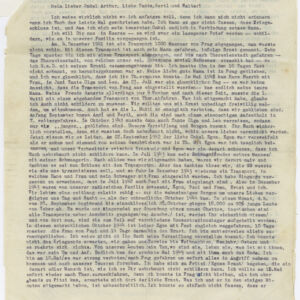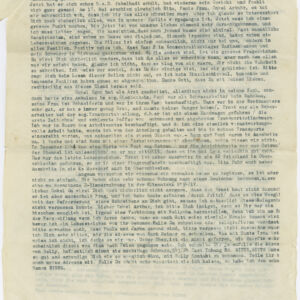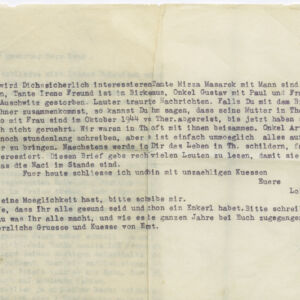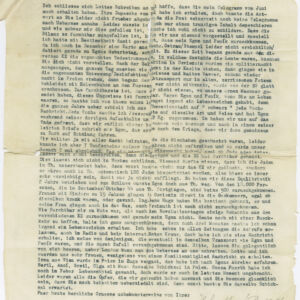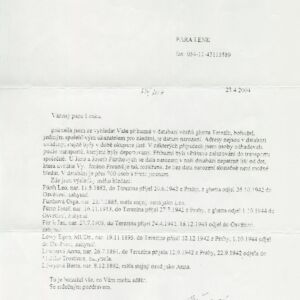Letters to Uncle Arthur, August 1945
Letters written post-war to Lotte’s uncle Arthur Lenk; Arthur was Greta’s brother. The first letter was written by Lotte to her uncle Arthur in Buenos Aires on August 9th, 1945. The next letter was written and hand-signed by Fritzi Hofrichter, fiancée of Lotte’s Uncle Egon, on August 10th, 1945. Egon was murdered during the war. The final letter contains a partial list of murdered family members from the Terezin Memorial Archives. Translations are below.
Document 1 – Lotte’s Letter to Uncle
Prague, August 9, 1945.
To my dear Uncle Arthur, dear Aunt Gertl, and Walter!
I really do not know where to begin, since I cannot remember when I last wrote to you. I can hardly comprehend that the war is over and that I can finally contact my dearest uncle again.
I will only write you a brief description of what happened to our family – a longer letter will come later.
On December 4, 1941 a transport of 1000 men left Prague, we didn’t know where to. My husband Ernest was on the transport. Ten days later I departed on a transport to Theresienstadt – the same Theresienstadt which our late Grandfather had told us so many good things about – where I, thank God, was once again reunited with Ernest. His health had deteriorated so much in those ten days that I could hardly recognize him. My dear mother [the addressee’s sister] remained in Prague, and I was happy that I could spare her from Theresienstadt. In May 1943 Hans Fuerth and his wife arrived, and in June Aunt Olga and Leo. July 23rd was a happy day. There was no chance that the transports from Prague would end, and my dear mother finally arrived in Theresienstadt. My happiness lasted only 4 weeks, and then my dear mother departed on an outward bound transport from Theresienstadt. I don’t have to describe to you how I felt. Ernest and I desperately wanted to volunteer to go with her, but my dear mother forbid us so vehemently that we decided to stay. At the beginning of September Anci and Bertl arrived, and they also continued onward after a week-long stay in Theresienstadt. In October 1942 Aunt Olge and Leo also left, so that only us “young ones” remained. You can surely imagine our despair and sorrow, not knowing where our loved ones had been sent. On September 22, 1942 – dear Uncle Egon. Egon was distressed when he arrived and none of his siblings were in Theresienstadt. I spent every day together with Egon, and the relationship between Egon, Ernest and I was so close that I can hardly describe it to you. In July 1943 my husband’s brother-in-law and sister-in-law arrived. After everything that we had seen, we were still somewhat naive and thought that the transports had ended. But only we believed that. The SS knew how to torment us, and in December 1943 another transport departed, this time with Hans [Ernest’s brother] and his wife and my brother-in-law and his wife. I forgot to mention at the beginning that Pepi and his wife arrived in July 1942. So in December 1943 only Egon, Pepi and his wife, Ernest, and I remained of our large family. We lived in relative peace for a while – despite the panicked fear for our loved ones day and night – when the terrible month of October 1944 was upon us. Over the period of a month, beginning September 28 and ending October 28, around 90% of the young people were deported from Theresienstadt. We were told that a new ghetto was being built, and that in the meantime all transports would go through Auschwitz (what Auschwitz is, you surely know) and from there they would be dispatched to different concentration camps. During the terrible October 1944 both Egon and Pepi were taken away. Ten days later Pepi’s wife, and fourteen days after that Ernest. I was left behind on my own. I do not know if you can imagine my despair. I could not wait until the end of the war, we planned meetings for Christmas, New Year, Easter, but nothing changed. We heard nothing from our family members, where they were, if they were alive, how they were — that was all that mattered to me. Finally came the May 1, 1945, and with it the end. On May 10 (when it was still strictly forbidden) I drove to Prague to set to work on everything and inquire into our things. I left this job to Fritzi (Egon’s bride), such a kind-hearted person that I can hardly describe her to you. I wanted to return to Theresienstadt as quickly as possible on May 10 because I could not remain in Prague, but when I went to Fritzi’s that evening my dear Ernest was waiting for me there. What he and I experienced in those few minutes is impossible to put into words. I could simply not believe that he was alive and standing next to me. He looked terrible – he had lost about 40 kilograms, his feet were badly swollen, and almost his entire body was covered in festering wounds. Now he has recovered remarkably, regained his weight, and feels healthy once again. On May 18 Pepi’s wife Rita showed up.
Uncle Arthur, it pains me terribly to write all of this to you, but I believe you want to know about everything that has happened to our family. I must tell you that until now no more of our loved ones have returned, and sadly the chances that any of them will are minimal. Almost all of the repatriates have returned already, and those who are far away have at least sent news. The situation is simply terrible, and not only for us, but for all families. I know that Hans F. died in the Sachsenhausen concentration camp, and that my brother-in-law died in Birkenau. Where the others are is completely unknown. You will definitely wonder how I can write all of this down, but after everything that we’ve experienced I don’t believe it would be right of me to keep the truth from you. All I know is that you are the only one of my family who remains. Please don’t upset yourself reading this, ours is no unique fate; thousands and thousands of families have been separated in the same way. Thank god that you and your loved ones escaped this suffering in good time.
Uncle Egon worked as a doctor, not in his field but in an ambulance in the so-called infirmary. Pepi worked as a laborer on the construction of the railway, his wife worked as a seamstress. Hans worked in the bread bakery, so he always had enough bread and never went hungry. Ernest worked in the so-called Transport Department, meaning that he lugged suitcases from arriving and departing deportees in a handcart (and at first without one). I worked at the employment center, and as I had a relatively important position I was fortunately never sent out on a transport. Egon and Pepi were in Auschwitz for about a week and then departed with a “Working Transport”, we do not know where to. In December 1942 a card arrived from Pepi from Ostrau (only the postcard was from Ostrau – the stamp is illegible) in which he wrote that only that he and Egon were doing well. That was the last news we heard from them. Ernest went from Auschwitz to the Friedland concentration camp in Oberschlesien, where he worked in an aircraft factory. Rita traveled through Auschwitz on the way to the concentration camp Merzdorf, also in Oberschlesien.
We are slowly trying to begin a normal life again, but it isn’t so easy. We have a very decent apartment which we got from a German, a beautiful two bedroom apartment at Klimentska No 34 / 1V.
Dear uncle, I’m sure you won’t mind that Ernest isn’t able to write today as he isn’t in Prague, and when I found out today (from Fritzi) that it might possible to convey a message to you I could not miss the opportunity. Dear uncle Arthur, I sincerely beg you to contact Nellynka [Lotte’s sister who spent the war in Shanghai] if it is at all possible, because I am on the verge of despair when I think that God knows how many months have passed since we last heard anything from her. In the case that you can write or telegraph please mention that Paula and Jarka are healthy, please don’t forget. Apart from that I beg you to send me the address of Kurt Reiner. I don’t know what happened to Aunt Irma, I’m just trying to imagine. She did not come through Theresienstadt; perhaps she went directly from Vienna to Poland. I’m sending you Nelly’s address, hopefully it’s still correct: Hugo Schwarz, 943/24 East Yuhang Road. PLEASE, PLEASE uncle, be so good as to let me know how I can possibly get in touch with her. And please give her my address. In case you don’t know my name, I now have the beautiful name STERN.
You will also want to know that Aunt Mizza Masarek and her husband died in Litzmannstadt, Aunt Irene Freund in Birkenau, and Onkel Gustav, Paul and his wife and child in Auschwitz. Terrible news. If you see the brother of Hugo Pachner, tell him that his mother died in Theresienstadt. Hugo and his wife left Theresienstadt in October 1944, and as of now we have not heard a word from them. We were often together in Theresienstadt. Uncle Arthur, I could write for hours more, but it’s impossible to write down everything at once. Next I will write to you about life in Theresienstadt, if you are interested. Please show this letter to as many people as possible, so that they know what the Nazis are capable of.
That’s it for today. I am, with countless kisses,
Your Lotte.
If you can, please write to me.
I hope that you are all healthy and that you have a grandchild now. Please tell me exactly what you are up to and how the last year was for you.
With warm regards and kisses from Ernest.
[Translated by Sofia Sheri, Smith College ’18]
Document 2 – Letter from Fritzi
Dear Mr. Lenk:
I’m attaching Lotte’s letters and I hope that you also received my telegram in June. I received your telegrams in July but unfortunately could not reply earlier, as the post office at that time would not send telegrams overseas. Unfortunately I can only send you bad news, and I don’t have to tell you how difficult it is for me to write these things. No one could have imagined how horribly everything would turn out, and I was so sure that my Egon and Pepik would return, especially since I received a card from Ostrau (the stamps were unfortunately not clear) dating exactly to Egon’s birthday. At this time the so-called death transports had begun to leave from various concentration camps, and you can hardly imagine the condition that those people were in. After the selection in Oswiecim they were stripped stark naked, forced to stand naked in the cold for an entire day, and then go into the so-called “disinfection” with cold and hot water, again standing naked outside; then they left on the transports dressed in old, ripped rags with wooden shoes. Those who could not keep up were shot on the spot by the SS. The worst thing is that we didn’t know where our unfortunate loved ones had ended up, and the uncertainty was terrifying. If Egon and Pepik were still alive I would have heard from them already, because throughout that year I received messages through the underground from Theresienstadt. Every week I sent food packages the same way and Egon gained X.2 [the first number is obscured] kilograms during his stay there. We were waiting for everything to end, when we could finally be together again. In his last letters Egon wrote that we would visit you together when the war was over.
We desperately wanted to get married, because mixed marriages were protected, but unfortunately I could not get ahold of seven baptismal certificates from my ancestors and our application was denied twice. What everyone here experienced, whether Jew or Aryan, can hardly be described. All because of the destruction wreaked by the SS and the Gestapo. Words can’t describe it. No one could know that I supported the Jews in Theresienstadt, because if they did not only would I have been sent to a concentration camp, but 100 Jews in Theresienstadt automatically would have been executed. This meant always being careful not to let anything out. We performed this tightrope walk for two years, but in the end Egon still had to leave Theresienstadt. Of the 18,000 people who left Theresienstadt in September-October 1944 less than 500 have returned. Women with children up to 15 years old went directly to the gas chambers in Oswiecim, whether they were sick or healthy. You surely knew Hugo Gans. He and his wife also were sent to the gas chambers, and Greimuth still hasn’t returned. I felt so terrible when some of our acquaintances returned from various concentration camps after the revolution, but not my Egon. It’s out of the question to hope for his return now. I would have heard something from him after three months. I’ve already put a notice for him in all of the newspapers, by radio, and through the Red Cross. There has been no word from anyone who ended up in the same transport as Egon and Pepik, nor did any return home. Please write to us every now and then. From London you can write to us internationally. Lotte and I would very happy to get any news from a family member. Irma from Vienna was gassed on the trip to Poland. I heard that news after Egon was deported. Bertl, Anci, Gretl, and Olga and her husband met the same fate in Poland. I still was sending food to Honza Fuerth in February, but he was also killed at the last moment. Sadly all of the sacrifices we made were in vain and you can be happy that you emigrated in time, otherwise you could have met the same fate.
Although we haven’t met, best wishes from your
??? Bedřiška [the first name is illegible]
[Translated by Sofia Sheri, Smith College ’18]
